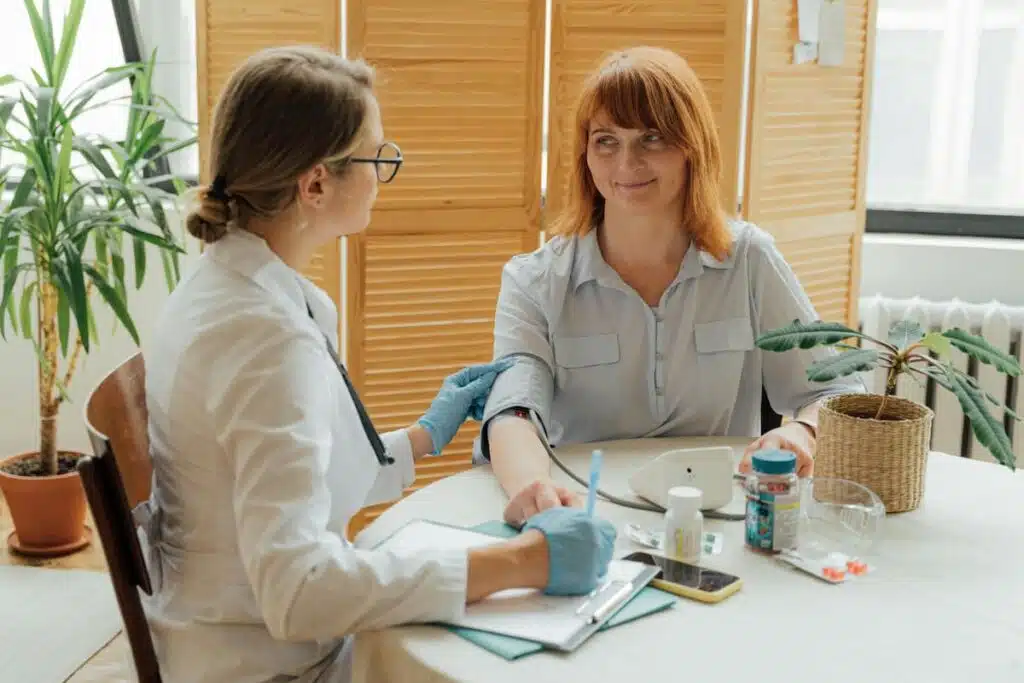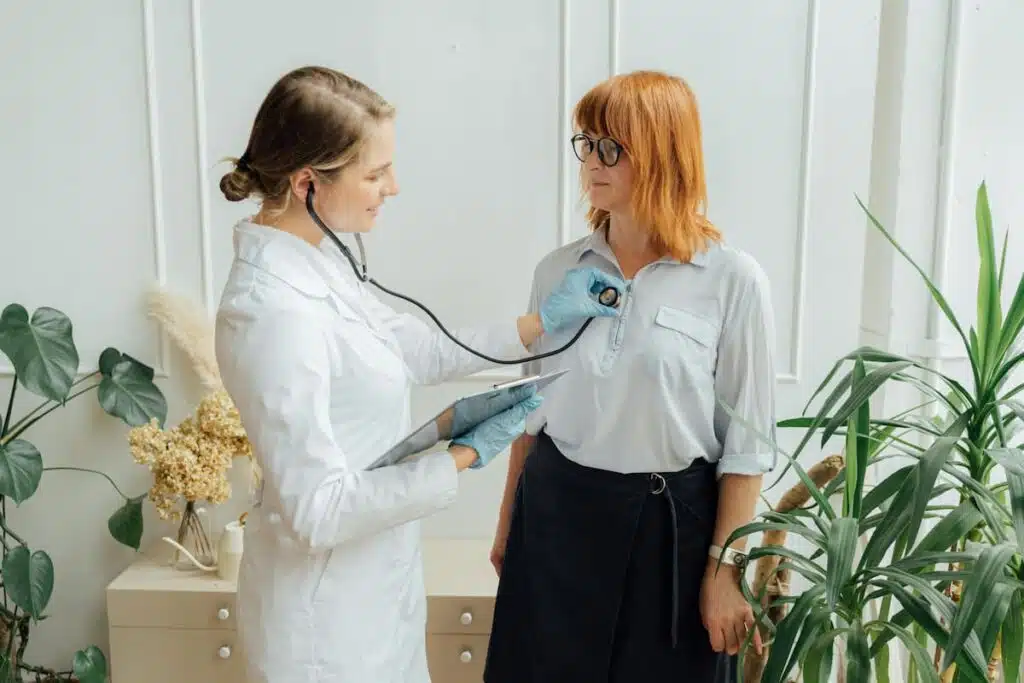Menopause—every woman has to go through this natural phase in their life. While it marks the end of reproductive years, it also opens the door to a deeper understanding of one’s body and health. For many women, this transition brings various challenges, such as mood swings, hot flashes, trouble sleeping, and vaginal dryness.
While inevitable, menopause doesn’t have to be overwhelming. In this blog, we’ll tackle the question, “What is menopause?” explain its causes and common symptoms, and discuss the many menopause treatment options available.
Whether experiencing early signs of menopause or simply preparing for the future, this guide will help women confidently walk through this natural transition.

Menopause refers to the natural end of a woman’s reproductive years, typically between 45 and 55. It is diagnosed when a woman has gone 12 consecutive months without menstruation. This transition happens because the ovaries stop releasing eggs and produce lower levels of key hormones like estrogen and progesterone.
Biologically, menopause is part of a gradual process that begins with perimenopause, the menopausal transition. During this time, hormone levels fluctuate, leading to hot flashes, night sweats, and mood swings. Once menopause is reached, the body adjusts to a new hormonal balance. Still, the decline in estrogen levels increases your risk of osteoporosis and cardiovascular disease.
While menopause is a normal part of aging, some women experience early signs of menopause before the age of 45 or even premature menopause before 40. Factors like genetics, medical history, cancer treatments (such as chemotherapy or radiation therapy), or surgical removal of the ovaries can trigger early or premature menopause. Recognizing these signs can help women seek timely support and treatment.
Menopause doesn’t happen overnight—it’s a gradual process that unfolds in three distinct stages, each marked by unique hormonal changes and symptoms.
Perimenopause is the period leading up to menopause, often beginning in a woman’s 40s but sometimes earlier. During this time, estrogen and progesterone hormone levels fluctuate, leading to irregular periods, hot flashes, night sweats, mood swings, and trouble sleeping.
This stage can last anywhere from a few months to several years. For some women, perimenopause begins earlier than expected, leading to signs of early menopause. Genetics, medical history, or cancer treatments can contribute to this early onset.

Menopause is officially confirmed when a woman has not had menstruation for 12 consecutive months. The ovaries stop releasing eggs at this stage, and estrogen and progesterone levels drop significantly. This hormonal shift can intensify symptoms like hot flashes, night sweats, vaginal dryness, mood changes, and memory issues.
This decline in estrogen levels also increases your risk of osteoporosis and cardiovascular disease. Women need to work with their healthcare providers to monitor these risks and explore treatment options like hormone replacement therapy or lifestyle changes.
Postmenopause begins after menopause and lasts for the rest of a woman’s life. During this phase, hormone levels remain low, and your menopausal symptoms may gradually decrease in severity. However, some women may continue experiencing postmenopausal symptoms like vaginal dryness or mood changes.
The health risks associated with low estrogen levels, such as osteoporosis and heart disease, become more prominent during postmenopause. Women should adopt healthy lifestyle changes to manage these risks, such as regular exercise, a balanced diet, and avoiding smoking. Healthcare providers may also recommend low-dose hormone therapy or medications to prevent osteoporosis.
Menopause symptoms vary from woman to woman, with some experiencing mild effects and others finding their symptoms worse and more disruptive to daily life. These symptoms are caused by the decline of estrogen and progesterone levels as the ovaries stop releasing eggs.
Some women may notice early menopausal symptoms, such as hormonal imbalances and irregular periods, in their late 30s or early 40s. These signs of early menopause include mood swings, hot flashes, and changes in menstrual cycle length. If you’re experiencing these symptoms earlier than expected, consult your healthcare provider to explore your treatment options immediately.
While menopause is natural, its symptoms can significantly impact daily life for many women. You don’t have to endure its symptoms without support. Various treatments are available to help manage symptoms effectively and suit every woman’s needs.

HRT is one of the most common treatments for managing menopausal symptoms. It works by replenishing estrogen and progesterone levels, which decline during menopause. HRT can ease hot flashes, night sweats, mood swings, and vaginal dryness. It also helps prevent bone density loss, lowering the risk of osteoporosis.
HRT comes in pills, patches, gels, and creams, allowing women to choose what works best for them. However, HRT is not without risks. It may increase the risk of blood clots, stroke, or certain cancers in some women. Before starting HRT, consult a healthcare provider to weigh its benefits and risks.
Lifestyle changes are crucial in managing menopause symptoms and promoting overall well-being. Maintaining a diet rich in vitamin D, calcium, and omega-3 fatty acids supports bone and heart health. Limiting spicy foods, caffeine, and alcohol may also help reduce hot flashes.
Strength training and cardiovascular exercises help manage your weight, improve mood, and strengthen bones. Lastly, stress management techniques like yoga, meditation, and deep breathing exercises can ease emotional symptoms and enhance sleep quality.
For women seeking non-hormonal options, natural and alternative remedies can provide relief from menopausal symptoms. Herbal supplements and soy-based products are popular for reducing hot flashes and improving sleep. However, you should consult a healthcare provider before trying them, as they may interact adversely with other medications.
Alternative therapies, such as acupuncture and holistic treatments, have also shown promise in managing hot flashes, night sweats, and sleep disturbances. These approaches can be part of a complementary and integrative health plan tailored to individual needs.
For women who prefer targeted treatments, certain medications can address specific menopausal symptoms.
While menopause naturally comes with age, some women experience symptoms that are severe or disruptive enough to require medical attention. Here are some signs that it’s time to consult a healthcare provider:

A healthcare provider evaluates your symptoms, reviews your medical history, and offers personalized menopause treatment options tailored to your needs, from hormone therapy and lifestyle recommendations to alternative remedies.
What is menopause? It marks the natural end of a woman’s reproductive years. While it’s inevitable, it doesn’t have to be difficult. You can regain your health and well-being by understanding its stages, recognizing common symptoms like hot flashes and mood swings, and exploring treatment options.
You don’t have to navigate menopause alone. At Transperity Medical Providers, we offer compassionate, expert care for women’s health tailored to your unique needs. Our personalized treatment plans include hormone replacement therapy, lifestyle changes, natural remedies, and medications for menopausal symptoms.
Face menopause confidently. Contact us and schedule a consultation today!